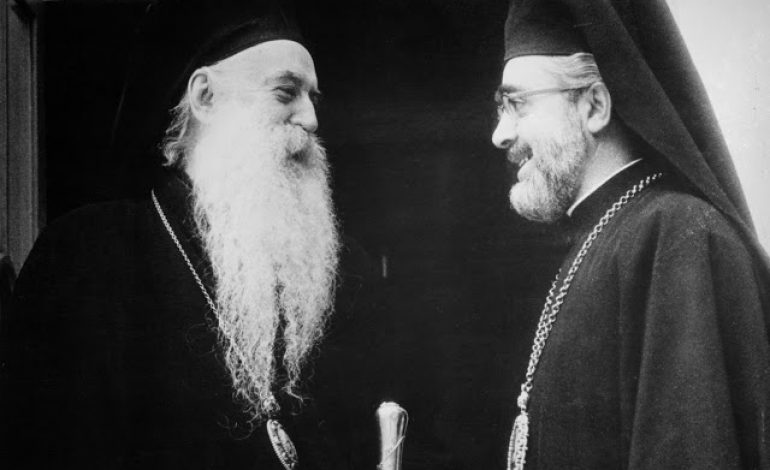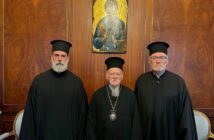Source: The National Herald
By Matthew Namee*

Then-Ecumenical Patriarch Athenagoras and Archbishop Iakovos of North and South America. (Photo: TNH, file)
For a while now, I’ve been documenting the close relationship between the U.S. government and Ecumenical Patriarch Athenagoras in the early years of the Cold War. It was thanks in large part to American influence that Athenagoras attained the throne in Constantinople, and he relished the idea that he was an agent of Americanism, the West’s counterweight to the ascendant Soviet-backed Moscow Patriarchate.
Things began to shift in the mid-1950s, as Greek Cypriots revolted against British rule in Cyprus, leading to tensions between the Greeks and Turks of the island. Turkey began to view the hundred thousand Greeks of Istanbul as a fifth column in their own midst, with the Ecumenical Patriarchate allegedly a political organization masked as a religious one. In September 1955, tensions erupted into a full-on riot: with the Turkish government’s encouragement, Muslims attacked their Greek Orthodox neighbors, burning churches, destroying homes and businesses, assaulting civilians, and raping women and children. When the dust settled, the United States didn’t really lift a finger to help its supposed ally, Athenagoras, who was by now distrusted by both the Turks and by his own Greek flock, who saw him as an enabler of Turkish oppression.
All this took place in the early years of the Khrushchev era in the Soviet Union – and Khrushchev was proving to be less interested than his predecessor Stalin in using the Russian Orthodox Church as a way to rally support to the Soviet cause. If the Moscow Patriarchate wasn’t as useful to the USSR, might that mean that the Ecumenical Patriarchate was of less value to the United States?
In the months following the September 1955 riot, articles began to appear in Turkish newspapers, calling for the Ecumenical Patriarchate to be moved out of Istanbul. Talk was just as intense internally, as declassified U.S. government records attest. Perhaps the EP could move to Mount Athos, or somewhere else in Greece where the EP had jurisdiction? Patriarch Athenagoras hated the idea of leaving Istanbul, but he preferred exile in some neutral territory like Switzerland over relocation to Greece. (This presaged the establishment of the Orthodox Center of the Ecumenical Patriarchate in Chambésy, Switzerland, in 1966.)
Meanwhile, Spyros Skouras, the Greek-American movie executive and power broker, pushed in the other direction, calling for a grand patriarchal palace to be built in Istanbul, and for the patriarchate to become a sort of Orthodox Vatican.
Against this backdrop, on December 19, 1956, Athenagoras was visited by the U.S. consul in Istanbul, Bob Miner, who sent this report on the meeting to the Secretary of State on December 22, 1956. You can read the full report online: https://shorturl.at/AUW05.
Here are some highlights:
The U.S. ambassador to Turkey (based in the capital, Ankara) had noticeably snubbed Athenagoras, not visiting him on his last stop in Istanbul. Consul Miner explained that this was due to Miner’s own advice: Spyros Skouras’ recent speech calling for the construction of a patriarchal palace had led to severe criticism of the patriarchate in the Turkish media, and “any call by Ambassador would have increased Patriarch’s difficulties.” Athenagoras said that he understood.
Perhaps most notably: “Entirely [on]his own initiative,” Athenagoras spoke of the “disservice” done to both him and Orthodoxy by Skouras and others, “who mistakenly persist [in]considering [the]oecumenical patriarchate similar to [the]Vatican. With great force Athenagoras stressed [the]history, tradition, [and]hierarchical structure [of the]Orthodox Church [to]emphasize [the]independence [of]individual national churches rather than authority [of the]oecumenical Patriarch.” Athenagoras said that any move to turn the EP into a Vatican-like entity would “arouse immediate opposition” from both the Church of Greece and the Turks, not to mention the other Orthodox: “Patriarch considers [it]entirely unrealistic to suppose that Russians, Greeks, Serbs, Rumanians, etc., would ever consider according [the]oecumenical Patriarch anything remotely resembling the supremacy [the]Roman Pope enjoys.”
The report continues:
For his part, he said he would do everything he could – and always had – to oppose any such distortion of [the]structure [of the]Orthodox Church.
Athenagoras expressed his appreciation for the United States’ interest in the Ecumenical Patriarchate.
The report notes:
On a local level hardly [a]week passes without direct contact between this office [the Consulate]and the Patriarch or members [of the]Holy Synod.
The consul and the patriarch discussed the possibility of moving the patriarchate out of Istanbul. The consul summed up the prevailing view in the patriarchate: “such prestige and limited primacy in spiritual matters [that the]oecumenical Patriarch possesses derive from his historical position as original primate of [the]capital and center of [the]Byzantine empire and would not survive transfer elsewhere of [the]patriarchate.” Some members of the Holy Synod thought that such a move would create a power vacuum and give the Moscow Patriarchate the opportunity to claim primacy.
Locally, the Greeks of Istanbul feared that if the patriarchate was moved out of Turkey, the rest of the Greek population would undoubtedly be deported, too. Miner tried to remain optimistic, ending the interview by emphasizing “his conviction [that]Greek-Turk relations can and must be improved, his determination [to]assist this development [in]all ways and his unshaken belief [that the]patriarchate’s presence in Istanbul is [an]asset rather than [a]liability in this work.”
In the end, the patriarchate remained in Istanbul, but tens of thousands of Greek residents were deported in the 1960s, gutting the patriarchate of most of its local flock. Athenagoras, increasingly irrelevant as a figure of Cold War diplomacy and intrigue, began to shift his attention away from the United States and toward religious dialogue: relations with the Roman Catholic Church on the one hand, and revival of the Orthodox pre-conciliar process on the other.
For us today, arguably the most significant feature of this 1956 consular report is that it demonstrates Athenagoras’ commitment to a traditional conciliar understanding of the role of the Ecumenical Patriarchate in the Orthodox Church, and his defense of Orthodox ecclesiology against external influences that attempted to distort it.
This viewpoint was originally published on February 15, 2024, on OrthodoxHistory.org. It has been republished in The National Herald with the author’s permission. For the original text, please visit: https://orthodoxhistory.org/2024/02/15/athenagoras-the-ep-is-not-an-orthodox-vatican/
*Matthew Namee is the Editor of OrthodoxHistory.org.



